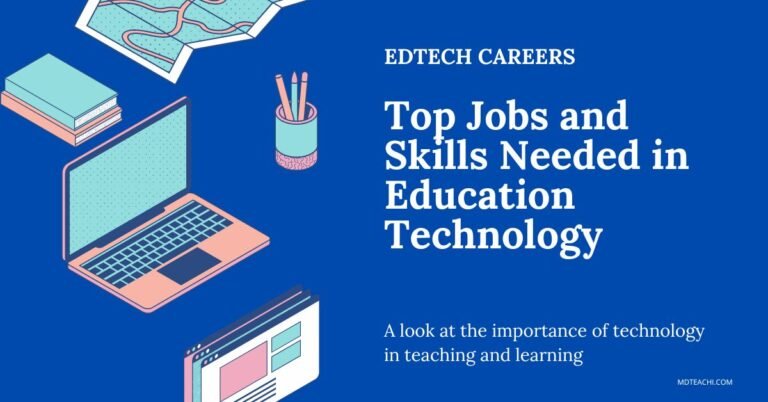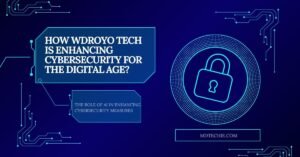Top Jobs and Skills Needed in Education Technology
Just as technology reshapes traditional education, it opens a realm of exciting career opportunities for you in the EdTech sector. With roles ranging from instructional designers to data analysts, understanding the key positions and necessary skills can help you navigate this evolving field.
This blog post will guide you through the top EdTech jobs and the vital competencies you need to thrive, ensuring you are well-equipped to make a significant impact in the world of education technology.

Understanding Education Technology
While the integration of technology in education transforms how students learn, your understanding of education technology can significantly enhance your career prospects in this thriving field.
By grasping the foundational concepts and trends, you can better position yourself as a valuable professional in the ever-changing landscape of EdTech.
Definition and Historical Context

Any discussion about education technology must start with its definition: EdTech refers to the use of technology to enhance teaching and learning experiences.
Historically, this began with simple tools like projectors and calculators but has evolved into sophisticated software systems that personalize education and track learner progress.
EdTech Trends and Evolution:
Evolution in EdTech tools has been remarkable, transitioning from basic teaching aids to advanced platforms that foster interactive and personalized learning experiences. The continuous advancement in technology has enabled educators and institutions to deliver more effective and engaging educational content.
The integration of smartphones, tablets, and high-speed internet access has revolutionized EdTech, allowing for a plethora of tools such as Learning Management Systems (LMS), virtual classrooms, and mobile learning apps.
These innovations not only facilitate remote learning but also provide diverse methodologies tailored to individual learning styles, enhancing engagement and retention for students across a broad spectrum of educational settings.
Current Trends in EdTech Adoption
With the rapid evolution of technology, you will find that current trends in EdTech adoption center around personalized learning, data analytics, and blended learning environments. These trends signify a shift toward more student-centered approaches in education.
Trends such as the increasing use of artificial intelligence in personalized learning platforms and the growing emphasis on data analytics for improving educational outcomes are reshaping the EdTech landscape.
As educational institutions invest in blended learning models that combine traditional and online methods, your skills in navigating and utilizing these cutting-edge tools can put you at the forefront of this transformative movement.
Skills Required for Success in EdTech

All successful careers in educational technology hinge on a unique blend of skills that combine technical expertise, pedagogical knowledge, and analytical capabilities. As the EdTech landscape continues to evolve, possessing the right skill set will empower you to navigate and excel in this transformative field.
Whether you’re interested in instructional design or product management, understanding these important skills will lay the foundation for your success in EdTech.
Technical Skills and Proficiency
Any career in EdTech requires a strong foundation in technical skills, such as software development, coding, and proficiency in learning management systems. Familiarity with educational technologies and digital tools will not only help you design innovative solutions but also enhance the learning experience for students.
Staying updated with emerging technologies will give you a competitive edge in the fast-paced EdTech environment.
Pedagogical and Instructional Methodologies
The ability to integrate effective pedagogical strategies is crucial in EdTech. Understanding instructional methodologies allows you to create content and tools that truly engage learners and facilitate meaningful learning experiences. This knowledge will enable you to tailor educational technologies to fit diverse learning needs and environments.
EdTech professionals who grasp pedagogical principles can bridge the gap between technology and education, ensuring that digital tools align with best practices for teaching and learning. By applying instructional design theories, you can create more impactful, learner-centered experiences that promote active engagement and knowledge retention, ultimately benefiting students and educators alike.
Data Analysis and Interpretation
Proficiency in data analysis and interpretation is important for EdTech success. This skill enables you to assess and leverage data to improve educational outcomes, drive informed decision-making, and enhance user experiences. As you analyze learner data, you can identify trends and areas for improvement that influence the development of effective educational tools.
For instance, interpreting metrics such as student engagement rates and learning outcomes allows you to refine educational products and ensure they meet the needs of users. By utilizing data to inform instructional design and product development, you can make a significant impact on the effectiveness of educational initiatives and better support students in their learning journey.
Developing Your EdTech Skill Set

Not only do technical skills play a vital role in EdTech careers, but necessary soft skills are equally important for success in this dynamic environment. As you navigate the evolving landscape of educational technology, developing and showcasing these interpersonal capabilities can significantly enhance your effectiveness and your team’s overall performance. In the collaborative world of EdTech, fostering strong relationships and adapting to change are keys to impactful innovation.
Certifications and Credentials to Enhance Career Prospects
Your career in educational technology can greatly benefit from acquiring relevant certifications and credentials. These qualifications not only showcase your expertise but also demonstrate your commitment to staying current in an ever-evolving field. By gaining specialized knowledge, you position yourself as a valuable asset in a competitive job market where EdTech roles are increasingly in demand.
Communication and Interpersonal Skills
One of the foundational skills for success in EdTech is effective communication. Whether you’re collaborating with educators, developers, or stakeholders, the ability to convey ideas clearly and listen actively is crucial. Strong interpersonal skills enable you to build rapport and ensure you’re addressing the needs of all parties involved, thereby enhancing teamwork and driving successful project outcomes.
Adaptability and Problem-Solving
Problem-solving is necessary in EdTech, where you frequently face unexpected challenges and changes in educational needs. Your ability to quickly adapt and find innovative solutions not only supports your professional growth but also helps to improve the learning experiences of students. EdTech professionals who demonstrate flexibility are often better equipped to meet the demands of this fast-paced industry.
Understanding the importance of adaptability is key in the rapidly evolving EdTech landscape. Technology continuously changes, requiring you to pivot and embrace new tools or methodologies frequently. By honing your problem-solving skills, you position yourself to tackle challenges head-on, allowing you to devise creative solutions that benefit both your team and the educational institutions you support.
Collaboration in Cross-Functional Teams
Communication is critical in facilitating collaboration across cross-functional teams in EdTech. Working with diverse groups of professionals, including educators, software developers, and business strategists, requires the ability to identify common goals and effectively share knowledge. Your success in fostering collaboration will directly impact project outcomes and the implementation of educational technology solutions.
Soft skills such as collaboration are paramount when working in cross-functional teams. They enable you to navigate differing perspectives and integrate diverse expertise, ensuring that all voices are heard in the decision-making process. By cultivating an environment of trust and open dialogue among team members, you contribute significantly to producing effective EdTech solutions that enhance student learning and engagement.
Industry-Recognized Certifications
An industry-recognized certification can significantly enhance your resume and appeal to potential employers in the EdTech space. These certifications often cover important skills and knowledge areas, helping you to stand out among other candidates who may not have formal qualification.
By pursuing certifications such as the Certified Educational Technology Leader (CETL), you ensure that you are well-equipped to navigate and excel in your EdTech career.
Continuing Education Courses and Workshops
Enhance your EdTech career by enrolling in continuing education courses and workshops. These learning opportunities allow you to deepen your knowledge and gain practical skills that are directly applicable to your work environment. From software tools to instructional design strategies, continuous learning is crucial for staying relevant in this fast-paced industry.
The rapidly changing landscape of educational technology means that staying updated is important. Courses offered by universities, online platforms, and professional organizations provide you with hands-on experience and updated information on the latest trends, tools, and methodologies in EdTech.
Engaging in such educational experiences also demonstrates your initiative to grow, which can significantly increase your appeal to employers.
Importance of Professional Networking

Career networking is vital in the EdTech sector, as it connects you with industry professionals who can open doors to job opportunities and collaborations. Building relationships with peers, mentors, and leaders in the field can lead to valuable insights and advice that will aid your professional growth. Your network can also provide referrals and recommendations, which are crucial in a competitive job market.
Prospects in the EdTech industry often hinge on who you know as much as what you know. Engaging in networking events, online forums, and professional organizations not only helps you stay informed about new trends but also puts you in touch with potential employers and collaborators.
Consider joining EdTech-specific groups on platforms like LinkedIn, as these connections can significantly enhance your career opportunities and lead to exciting new roles in an expanding field.
Why EdTech Careers Are on the Rise
Any individual interested in the intersection of technology and education is likely to find countless opportunities within the thriving EdTech industry. As classrooms increasingly incorporate digital tools, the demand for professionals who can seamlessly blend educational methods with technological advancement is on the rise.
This shift not only opens the door to fulfilling career paths but also enables you to make a meaningful impact in shaping the future of learning.
Benefits of EdTech for Students

On the forefront of today’s educational shift, the demand for digital learning solutions has skyrocketed. As traditional learning models evolve, educators and institutions seek innovative tools that can enhance engagement, accessibility, and overall educational outcomes.
This surge in demand fuels a growing need for skilled professionals capable of developing, implementing, and managing these necessary digital resources.
Rise in digital learning technologies correlates with improved learning experiences and outcomes for students. By integrating innovative tools and methodologies, you can create personalized educational pathways that cater to different learning styles, ultimately fostering a more effective learning environment.
The focus on analytics and student engagement ensures that education becomes a dynamic, interactive experience, rather than a static one.
Solutions in EdTech allow you to harness data analytics to tailor educational experiences according to individual student needs. By providing real-time feedback and customizable learning tracks, digital platforms facilitate a more engaging and comprehensive learning process.
This approach not only boosts student motivation but also enhances retention and comprehension, further emphasizing the importance of skilled professionals in this rapidly advancing field.
Inclusion and Accessibility in Education
Inclusion and accessibility have become paramount in shaping effective educational practices. With the rise of EdTech solutions, you now have greater opportunities to develop materials that are accessible to all learners, including those with disabilities. This focus on inclusivity can significantly improve educational outcomes, ensuring that every student has a chance to succeed.
This commitment to inclusion means leveraging technology to create adaptable learning materials that cater to diverse needs. By prioritizing universal design principles, you can develop resources that help eliminate barriers to learning, making education more equitable and inclusive.
As the demand for accessible learning solutions continues to grow, the EdTech field offers you the chance to be at the forefront of these crucial developments.
The Prominent EdTech Job Roles

Despite the evolving landscape of education technology, several job roles stand out as pivotal in shaping the future of learning. As the demand for EdTech professionals grows, you will encounter diverse positions, each contributing uniquely to enhancing educational experiences.
These roles, which include instructional designers, EdTech product managers, and educational technology specialists, are at the forefront of integrating technology into education, ensuring effective learning outcomes, and addressing the needs of modern learners.
Instructional Designer
Instructional designers play a crucial role in developing effective educational programs and materials. You will focus on creating engaging content that meets the diverse needs of learners, utilizing various instructional strategies and technologies to enhance comprehension and retention.
EdTech Product Manager
EdTech product managers are responsible for overseeing the development of educational technologies. You will coordinate with cross-functional teams to design, implement, and iterate on products that enhance learning experiences, ensuring that they are user-friendly, effective, and aligned with educational goals.
Instructional management is crucial as EdTech product managers bridge the gap between education, design, and technology. You will analyze user feedback, market trends, and educational research to guide product enhancements, ensuring that your initiatives address learners’ needs effectively in a rapidly changing educational landscape.
Educational Technology Specialist
Specialist in educational technology serves as a vital resource for schools and institutions. In this role, you will support educators in integrating technology into their teaching practices, helping them to improve engagement and learning outcomes through data-driven insights and training.
Manager in this position typically involves providing professional development to educators, evaluating technological tools, and recommending best practices for instructional technology usage. You will contribute to fostering a tech-savvy educational environment, ensuring that both students and teachers can leverage technology to enhance the learning process.
Designing Engaging Learning Experiences
To effectively capture learners’ attention, you must develop engaging online and blended learning experiences. This involves incorporating multimedia elements, interactive activities, and assessments that cater to diverse learning styles. Your role is crucial in creating a dynamic educational environment that encourages participation and fosters retention.
Managing Product Development Life Cycles
Learning to oversee the product development life cycle is vital for EdTech professionals. You will evaluate user needs, define product requirements, and coordinate with development teams to ensure timely delivery of educational technology solutions. This not only helps in creating effective tools but also ensures that they remain aligned with current educational standards.
Plus, understanding the intricacies of product development can significantly enhance your ability to deliver solutions that meet user expectations. You’ll be involved throughout various stages, from conception to launch and beyond, ensuring continuous improvement based on feedback.
This adaptability is vital for staying relevant in the ever-evolving EdTech landscape, which is witnessing increased demand for skilled professionals.
Supporting Educational Institutions and Faculty
The success of educational technology initiatives heavily relies on your ability to support schools and faculty members in integrating tech tools into their teaching methodologies. You will provide training and resources that help educators make the most of digital platforms, ultimately enhancing their instructional practices.
Designing tailored support programs can enhance the effectiveness of educational institutions in adopting new technologies. By collaborating closely with faculty, you can identify specific challenges they face and provide customized solutions.
This approach leads to more successful tech adoption and ultimately improves student learning outcomes, ensuring that you make a significant impact in the education sector.
Educational Pathways for Entering EdTech

Once again, the landscape of education is transforming, and you have the opportunity to be a part of this change. Entering the field of educational technology requires a strategic approach to your educational pathways. You can leverage various degree programs, online learning platforms, and hands-on experiences to build a robust skill set that meets the needs of this dynamic industry. Understanding the potential routes to an EdTech career will empower you to make informed decisions about your future.
Degrees Relevant to EdTech Careers
To break into the EdTech field, consider pursuing degrees that align with your career goals. Relevant programs include Educational Technology, Instructional Design, Data Analytics, and Computer Science.
These academic backgrounds provide you with a foundational understanding of how technology can enhance learning experiences and prepare you to tackle the challenges in this evolving landscape. Selecting the right degree can set you on a path to success in various EdTech roles.
Online Learning and Self-Directed Study
Relevant to your career growth, online learning and self-directed study offer flexible options to acquire important skills in EdTech. Numerous platforms provide courses focused on educational software, digital curriculum design, and data analysis, allowing you to learn at your own pace while maintaining your current commitments. This approach not only expands your knowledge but also enhances your employability in the competitive EdTech job market.
It is important to recognize that online learning allows you to tailor your education according to your interests and career aspirations. Whether you prefer structured courses from established institutions or informal tutorials through platforms like Coursera or Udacity, taking the initiative to engage in self-directed study can significantly enhance your expertise in areas such as instructional design and data management. By continually updating your skills, you will remain relevant in a rapidly changing professional landscape.
Practical Experience through Internships
One effective way to gain a foothold in the EdTech industry is through practical experience gained via internships. Many educational technology companies offer internship programs that expose you to real-world challenges and allow you to apply the skills you’ve acquired through your studies.
These hands-on experiences not only enhance your resume but also provide invaluable networking opportunities that can lead to full-time positions.
Self-directed internships can also be a great option. You might consider reaching out to local schools or organizations to offer your expertise in using technology for educational purposes. By volunteering your time to assist with EdTech initiatives, you not only gain experience but also demonstrate your commitment to improving educational practices through technology.
This proactive approach can significantly enhance your profile and position you ahead of other candidates in the EdTech job market.
Launching Your EdTech Career

Many professionals in the EdTech field recognize the significance of a well-crafted portfolio that showcases your skills and achievements. Given the competitive nature of the industry, a strong portfolio is not merely a collection of projects; it serves as a powerful tool to demonstrate your expertise, creativity, and the impact you’ve made in educational technology.
Navigating the Job Market in EdTech
For those looking to make an impact in the evolving landscape of education, navigating the job market in EdTech can be both exciting and challenging. Understanding the various roles available, recognizing emerging trends, and leveraging your skills will give you a competitive edge.
By staying informed about industry developments and networking with professionals, you can identify the best opportunities that align with your aspirations in this dynamic field.
Importance of Showcasing Work
Portfolio elements are necessary for demonstrating your capabilities and achievements to potential employers or clients. By highlighting your work, you provide concrete evidence of your skills, making it easier for others to understand your expertise in educational technology. An effective portfolio can be a key differentiator in a crowded job market.
Portfolio Elements to Include
EdTech portfolios should include a variety of elements, such as examples of instructional design projects, case studies of successful EdTech implementations, and demonstrations of your technical skills. Including testimonials from educators or clients can add value, illustrating the positive impact of your work. Ensure that your portfolio reflects your versatility and depth within the field.
Strategies for Continuous Portfolio Updates
Building a portfolio that evolves with your career is crucial in the fast-paced world of EdTech. Regularly updating your portfolio with new projects or skills ensures that it reflects your most current capabilities and experiences. Aim to refresh it every few months to stay relevant and showcase your growth.
This involves setting a schedule for reviewing your portfolio, identifying new projects you can include, and actively seeking opportunities to expand your skill set. Engage in continuous learning—such as taking courses or attending workshops—and document your journey.
By doing so, you will maintain a comprehensive and compelling portfolio that resonates with prospective employers in the educational technology landscape.
Identifying Target Employers
EdTech presents a variety of potential employers, ranging from startups to large educational institutions. Focusing your job search on companies that resonate with your values and goals will not only enhance your job satisfaction but also support your professional growth.
Be sure to research organizations that prioritize innovation in education and look for those dedicated to improving learning outcomes through technology.
Utilizing Job Boards and Social Media
Social media platforms and specialized job boards are invaluable resources for landing a position in the competitive EdTech sector. By creating a robust online presence, you can connect with industry leaders, follow relevant companies, and stay updated on job openings.
Websites like LinkedIn, Glassdoor, and EdSurge offer tailored job listings that cater specifically to EdTech roles, enabling you to streamline your application process.
Utilizing these platforms goes beyond job searching; it’s about building your professional network. Engage with content related to education technology and showcase your expertise by sharing insights or articles.
Participating in discussions and joining EdTech groups can help you forge connections with potential employers and like-minded professionals, enhancing your visibility in the field.
Preparing for Interviews in EdTech
EdTech interviews often emphasize your technical skills as well as your understanding of educational practices. Preparing for these interviews requires researching the company’s products, culture, and values while also reflecting on how your background aligns with their mission. Your ability to articulate how technology complements effective teaching will be key during the interview process.
Another crucial aspect of interview preparation is practicing responses to common EdTech-related questions. Consider studying recent trends, such as the importance of data analytics in personalized learning or the impact of AI on education.
Demonstrating that you’ve kept up with industry advancements will showcase your passion and commitment to contributing to the future of education technology.
FAQs
What types of companies or organizations hire EdTech professionals?
EdTech professionals are employed by a range of organizations, including educational technology startups, K-12 schools, higher education institutions, corporate training departments, and government agencies. Nonprofit organizations and educational content providers also seek EdTech expertise.
What is the job outlook for EdTech professionals?
The job outlook for EdTech professionals is promising, as the demand for innovative educational solutions continues to grow. The increasing integration of technology in education drives the need for skilled individuals to develop and manage these tools, creating diverse opportunities in the field.
Are there any certifications that can enhance my career prospects in EdTech?
Yes, certifications such as Certified Educational Technology Leader (CETL), CompTIA IT Fundamentals (ITF+), and Google Certified Educator can boost your credentials. These certifications validate your skills and knowledge, making you more attractive to potential employers.
Final Words
Conclusively, exploring into EdTech careers presents you with an exciting opportunity to shape the future of education through innovative technology. By understanding the top jobs and crucial skills within this dynamic field, you can enhance your professional journey and position yourself for success.
Embrace the potential that educational technology holds and take proactive steps to align your skills with the demands of this ever-evolving industry, ensuring that you are well-equipped to make a meaningful impact in how students learn and engage with information.

Daniel E
Hey there! I’m Daniel E, your friendly tech guide. At MD Techie, I unravel tricky tech stuff, making it easy-peasy for both newbies and seasoned pros. Think of me as your decoder ring for all things geeky!” 🌟🔍🚀




